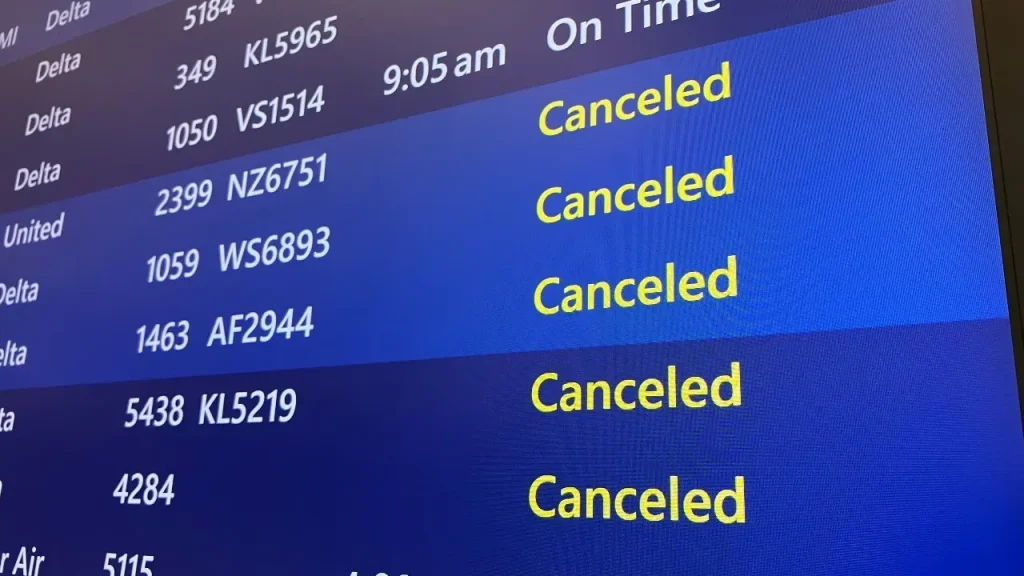In recent news, United Airlines flight cancellations have become a pressing issue at Newark Liberty International Airport, where the airline is set to cut 35 roundtrip flights daily. The airline’s CEO, Scott Kirby, attributed these disruptions to significant staffing shortages among air traffic controllers and ongoing technology issues stemming from the Federal Aviation Administration (FAA). The ripple effects have been notable, with over 1,000 flights impacted, including more than 300 delays just last Friday. This decision, representing a 10% reduction in United’s Newark flight schedule, underscores the challenges posed by air traffic control issues during a tumultuous travel week. As United Airlines navigates these cancellations, the airline has also initiated a waiver of change fees for affected passengers, attempting to alleviate some of the stress for those experiencing flight delays at Newark.
As air travel experiences unprecedented disruptions, United Airlines has found itself at the forefront of flight cancellations impacting Newark’s air traffic. The company has been compelled to alter its schedule drastically, citing rampant air traffic control shortages and technological glitches linked to the FAA as key factors. These operational challenges have catalyzed a wave of flight delays and have raised concerns about the reliability of air travel. With approximately 10% of United’s normal service at Newark being cut, the airline is making efforts to cushion the fallout for its customers. Individuals looking for information on the latest United Airlines news and Newark flight disruptions are advised to stay informed as this situation continues to evolve.
Understanding the Reasons Behind United Airlines Flight Cancellations
United Airlines has announced significant flight cancellations, specifically 35 roundtrip flights daily, at Newark Liberty International Airport. This operational change is primarily due to a confluence of factors including staffing shortages among air traffic controllers and ongoing technological issues within the FAA. These disruptions are not isolated incidents; with over 1,000 flights affected recently due to more than 300 delays and numerous cancellations, travelers are left questioning the reliability of their flight schedules, especially amidst the chaotic travel climate.
The challenges United Airlines faces are emblematic of broader systemic issues within air travel. CEO Scott Kirby’s decision to reduce their already limited flight schedule reflects a drastic measure to ensure passenger safety and service reliability. The implications of these cancellations extend beyond immediate travel plans, as travelers must now navigate complex logistics and potential inconvenience, demonstrating the far-reaching impact of flight delays and cancellations at Newark.
The Impact of FAA Staffing Shortages on Air Travel
FAA staffing shortages have become a critical issue leading to significant delays and flight cancellations at Newark Liberty International Airport. With 20% of air traffic controllers absent from Newark due to technical failures, the burden on remaining staff has escalated, resulting in heightened congestion and longer wait times for travelers. The continued underperformance of the air traffic control system raises questions about the FAA’s ability to maintain effective oversight and management of airspace, leading to increased frustration among airlines and passengers alike.
The repercussions of these staffing challenges also extend to operational efficiency. The FAA’s decision to reassign controllers to Philadelphia indicates a strategic attempt to address congestion, but it also highlights the need for immediate reform in air traffic protocols. Transportation Secretary Sean Duffy’s acknowledgment of outdated technology underpins the urgency for a new air traffic control system that could alleviate workloads and improve overall service at high-traffic airports like Newark.
Air Traffic Control Issues and Flight Delays at Newark
Air traffic control issues severely impact Newark Liberty International Airport, causing widespread flight delays and cancellations affecting thousands of travelers. Recent reports indicate that over 1,400 flights faced disruptions, drawing attention to the broader consequences of a malfunctioning air traffic control system. As flights are regularly delayed, the ripple effect spreads across various airlines, exacerbating the travel chaos faced by passengers.
Without adequate solutions, these air traffic control competencies remain strained. The suggestion for the FAA to implement stricter capacity limits at Newark and other heavily congested airports reflects a proactive approach in addressing the issue. Both travelers and airlines alike are eager for long-term solutions that will not only mitigate current frustrations but also establish a foundation for reliable air travel moving forward.
Ongoing United Airlines News and Customer Advisories
Recent United Airlines news highlights the company’s ongoing efforts to navigate flight disruptions while keeping customer service in focus. Given the abrupt flight cancellations at Newark, the airline has proactively waived change fees and fare differences for passengers affected by these adjustments. This customer-centric approach aims to alleviate some of the stress caused by cancellations and delays and demonstrates United’s commitment to service continuity during tough times.
Additionally, as travelers increasingly seek assurance in their travel plans, clear communication from United Airlines is vital. Updates about flight statuses, potential rebooking options, and fare waivers help maintain customer trust. As the airline adapts to the changing landscape of travel caused by staffing shortages and operational challenges, transparent communication will become essential in fostering strong relationships with its passenger base.
Addressing Newark Flight Disruptions: What Travelers Should Know
Travelers facing disruptions at Newark Liberty International Airport need to stay informed about the current situation regarding their flights. With United Airlines canceling a significant number of roundtrip flights, those planning to fly should regularly check for updates via their airline’s app or website. Being proactive can help passengers stay ahead of uncertainties and potentially find alternative travel arrangements if necessary.
Moreover, understanding the reasons behind these disruptions—such as FAA staffing shortages and air traffic control challenges—will enable travelers to empathize with the situation. While these issues are frustrating, remaining flexible and patient as a traveler can enhance the overall experience amidst the existing chaos. In light of these changes, having an awareness of support options provided by airlines, including fare waivers and customer service resources, empowers travelers to make informed decisions.
What to Expect with Future Flight Operations at Newark
As United Airlines continues to navigate staffing shortages and technological issues at Newark, the future of flight operations will depend heavily on the effectiveness of the FAA’s strategies for managing these challenges. Expectations for more reliable operations hinge on the successful implementation of necessary improvements, including stricter capacity limits and much-needed updates to air traffic control technology. Such changes, if executed properly, could alleviate congestion and restore confidence among passengers.
In the interim, travelers must prepare for continued disruptions as the airline adjusts its capacity in response to these operational hurdles. While United Airlines is taking steps to adapt, the road ahead may still involve unforeseen delays and cancellations. Understanding this evolving landscape will help travelers set realistic expectations while they navigate connecting flights, alternate routes, or even extended travel times.
Strategies for Managing Travel Plans Amidst Flight Cancellations
With the recent wave of flight cancellations affecting Newark, travelers must develop contingency strategies to manage their travel plans effectively. One practical approach is to consider booking alternative flights with different airlines, rail transportation, or flexible travel dates to avoid peak congested periods. By diversifying options, travelers can secure more reliable flights while navigating a turbulent travel landscape.
Additionally, utilizing travel insurance that covers delays and cancellations can be a wise investment amidst uncertainties. This financial safety net can provide peace of mind should unforeseen circumstances disrupt travel plans. Keeping abreast of real-time information related to Newark flight disruptions and remaining adaptable to changing situations will also prove essential for travelers facing the aftermath of cancellations.
The Importance of Communication During Newark Flight Delays
As Newark Liberty International Airport grapples with significant flight delays and cancellations, the importance of communication cannot be overstated. Airlines like United Airlines must prioritize keeping passengers informed about potential disruptions through timely notifications and updates. This initiative is crucial for helping travelers make informed decisions regarding their travel options and reduces frustration that arises from uncertainty.
Simultaneously, travelers should engage with their airlines directly for the latest information regarding their flights. Utilizing customer service hotlines, social media, and mobile applications ensures that they are receiving prompt updates. In an environment where flight operations are frequently changing, fostering a robust communication channel benefits both airlines and passengers by streamlining the process surrounding cancellations and alternate travel solutions.
Looking Ahead: Potential Solutions to Flight Disruptions
Addressing the current flight disruptions at Newark requires a multifaceted approach that considers both immediate and long-term solutions. The call for a new air traffic control system is a critical step in the right direction, potentially increasing operational efficiency and relieving pressure on controllers overwhelmed by outdated technology. Continued discussions between airlines, the FAA, and government officials will be vital as stakeholders work collaboratively towards sustainable improvements.
Furthermore, investments in training programs for air traffic controllers could alleviate staffing shortages, ensuring that more qualified personnel can manage the increasing demands of air travel. Consideration for automated systems could also enhance capacity and reduce delays caused by human error. The future of flight operations at Newark hinges on these strategic initiatives, aimed at protecting travel interests while fostering a more reliable flying experience.
Frequently Asked Questions
What are the main contributors to United Airlines flight cancellations at Newark?
United Airlines flight cancellations at Newark Liberty International Airport are primarily due to staffing shortages among air traffic controllers and ongoing technology issues with the FAA. Recent reports indicate that a significant number of air traffic controllers have left their positions, causing severe disruptions to flight schedules.
How many flights is United Airlines canceling daily at Newark due to disruptions?
United Airlines is canceling 35 roundtrip flights daily from Newark as a response to the recent disruptive conditions affecting air traffic control and operational challenges, which represent about 10% of its total flights from the airport.
What should passengers know about United Airlines news concerning flight delays at Newark?
Passengers should stay updated with United Airlines news, as ongoing flight delays at Newark are largely influenced by air traffic control issues and staffing shortages. The airline is waiving change fees for customers affected by the cancellations and delays.
How is United Airlines addressing flight delays and cancellations at Newark?
United Airlines is proactively waiving change fees and fare differences for customers impacted by flight delays and cancellations at Newark. The airline is working to mitigate the effects of air traffic control shortages and ensure passenger interests are protected.
What steps is the FAA taking to improve air traffic control issues affecting Newark?
The FAA is addressing air traffic control issues at Newark by reassigning controllers and acknowledging the need for a new air traffic control system due to outdated technology. These efforts aim to alleviate congestion and improve operational efficiency.
Why are there so many flight delays at Newark recently?
Flight delays at Newark have surged due to air traffic control shortages, exacerbated by staffing issues at the FAA and technical failures. Over 1,400 flights have experienced delays in a single week, contributing to the growing concern among travelers.
What can passengers expect when flying with United Airlines during Newark’s operational issues?
Passengers flying with United Airlines during Newark’s operational challenges can expect potential flight cancellations and delays. The airline is implementing measures such as waiving fees for changes to provide relief to those affected by the ongoing disruptions.
Are there specific times when flight cancellations are more likely at Newark?
While cancellations can occur at any time, they are particularly prevalent during peak travel periods when air traffic control issues are compounded by high volume. Passengers should remain vigilant for updates regarding United Airlines flight cancellations and potential delays.
What is the impact of FAA staffing shortages on United Airlines flight operations?
FAA staffing shortages are significantly impacting United Airlines flight operations at Newark, leading to a reduction in available air traffic controllers. This has resulted in increased flight cancellations and delays as the airline struggles to maintain a fluid operating schedule.
How is the current air traffic control situation affecting my travel plans with United Airlines?
The current air traffic control situation at Newark is likely to affect your travel plans with United Airlines by causing possible flight cancellations or delays. It’s advisable to check for updates and plan your journey accordingly.
| Key Point | Details |
|---|---|
| Flight Cancellations | United Airlines will cancel 35 roundtrip flights daily from Newark Liberty International Airport. |
| Causes of Cancellations | Staffing shortages among air traffic controllers and FAA technology issues are major contributors. |
| Impact on Flights | More than 1,000 flights impacted, with over 300 delays reported in a single day. |
| Reduction Percentage | The cancellations represent about 10% of United’s daily flights at Newark. |
| Customer Communication | CEO Scott Kirby expressed disappointment and emphasized measures to protect passenger interests. |
| FAA Advisory | The FAA confirmed that operations at Newark were being delayed due to staffing issues. |
| Alternative Solutions | Kirby suggested enforcing stricter capacity limits similar to LaGuardia and Ronald Reagan Washington. |
| Support for Affected Passengers | United is waiving change fees and fare differences for affected customers. |
Summary
United Airlines flight cancellations have become a significant issue due to ongoing staffing shortages and technical failures highlighted during recent disruptions at Newark Liberty International Airport. As the airline implements these necessary cuts to ensure safety and efficiency, it underscores the pressing need for solutions to the air traffic control crisis. Passengers affected by these changes are being supported through waived fees, yet the situation highlights the unresolved challenges in air travel management, calling for urgent improvements from the FAA.



